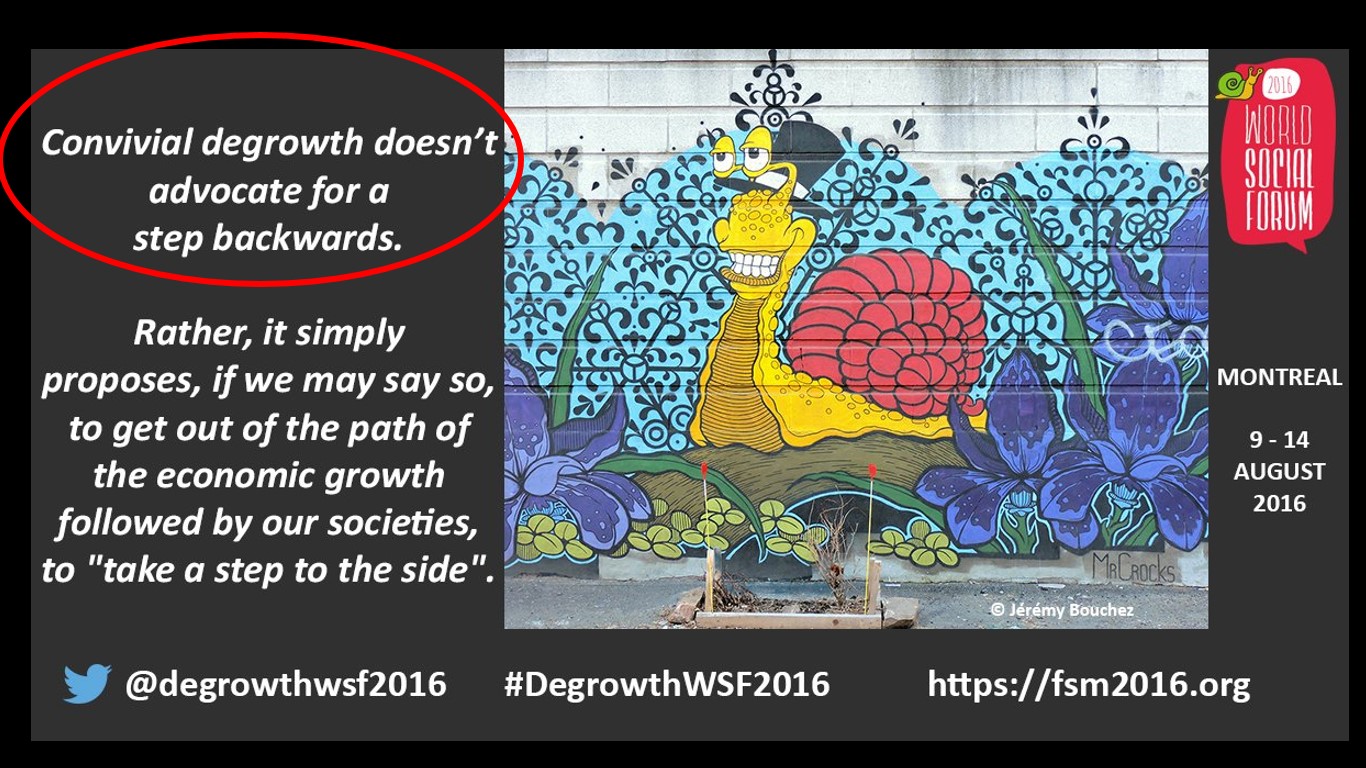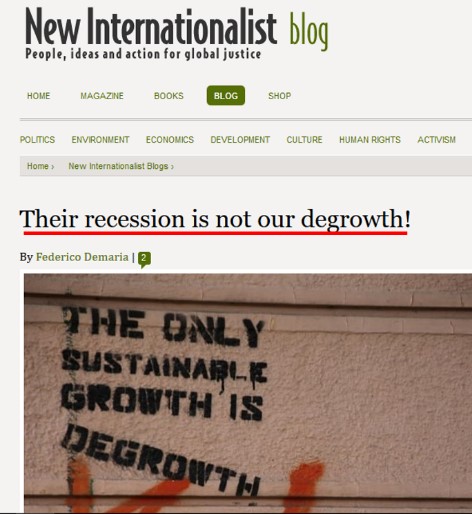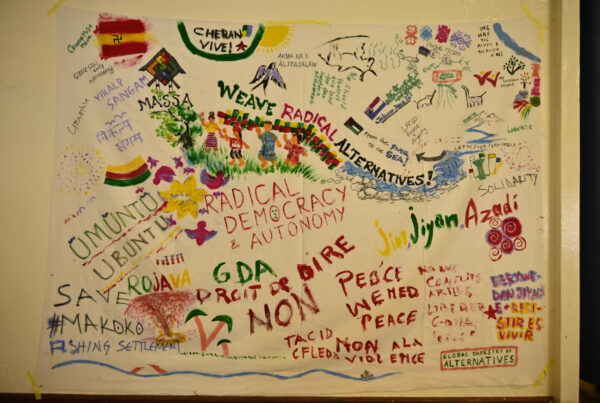By Miklós Antal*
How can we create a positive attitude towards alternative economic directions while keeping the advantages of the concept of degrowth?
In a recent article with Stefan Drews in the journal Ecological Economics, we discussed why degrowth might be an unfortunate name and slogan for the alternative economics movement. We listed several expressions that could possibly be better, but we were also upfront about their disadvantages. Here I propose a new term that might combine the advantages of the word “degrowth” with those of its more positive alternatives.
For an assessment, a brief review of pros and cons of the current slogan is given. “Degrowth” satisfies some important criteria of a good catchword. Most notably, it raises attention. As it sounds contradictory to the currently accepted goal, it promises a real alternative. This is interesting and provocative. The word is also short and easy to remember. Besides, it has not been misused or co-opted by the mainstream yet.
However, there are serious downsides. First, degrowth has a downward orientation, and “down is bad” according to a primary metaphor rooted in physical experiences. Already in ancient Rome, down meant death. We feel down and need to be cheered up. Hell is below us, heaven is above. The association of up with good and down with bad will not change in the foreseeable future. And growth is up. Plants grow upwards. We grow up, not down. Therefore, at a deep unconscious level growth is good and degrowth is bad.
Second, degrowth is not “simply different.” Deregulation is the opposite of regulation, decolonization is the opposite of colonization, degrowth is the opposite of growth. Any sensible person seeing the image above of the elephants and knowing that two of the four labels used for the four illustrations are “growth” and “degrowth” would intuitively put these labels on the first and the third illustrations. The degrowth slogan is a source of endless misinterpretations.
Third, the most logical misinterpretation is GDP reduction, so conversations often revolve around the relationship between degrowth and recessions, if not a return to the cave. Activating these frames will not help to gain support for new solutions, no matter how promising the solutions might be. But popular support is essential to forcefully challenge the paradigm of economic growth.

Degrowth discussions often start with negative frames, which is counterproductive. Source: Decroissance Montreal
In a complex world where attention is scarce, first impressions are crucial. Degrowth spurs debate, but the debate will likely be lost. So how could we create a positive attitude towards alternative directions while keeping the advantages of degrowth?
My suggestion? D.E.growth
Building on the popularity of the growth frame, the term can be intriguing. This is crucial to raise attention, and from this aspect, it might be better for a radical movement than slogans like “sustainable prosperity” or “good life”. Invoking growth in an innovative and somewhat puzzling way can help to focus attention on the issue of economic growth and to trigger discussions about its future, which is an important goal of the alternative economics movement.

Source: New Internationalist blog
Unlike in the case of degrowth, however, first subconscious reactions to “D.E.growth” slogan might be positive. As the two capital letters in the beginning are separated, the first clearly understandable part is “growth”, and growth is up, and up is good. All subsequent information processing will then be influenced by the first positive subconscious evaluation.
Looking just a little more closely – which happens naturally when a term is not immediately understandable and refers to something yet unknown – one might suspect that it signifies something contradictory to the current paradigm. But this is already conscious thinking, exactly what members of the movement want to trigger. The resemblance to degrowth can help to keep the radical tone and much of the “missile word” effect emphasized by proponents of the current slogan. Furthermore, being a new expression, D.E.growth has not been co-opted by the mainstream yet. It is also short and easy to remember.
Seeing the abbreviation for the first time, one might wonder about its actual meaning. Curiosity and more or less correct guesses about the topic it refers to are a much better combination than the harmful misunderstandings that characterize “degrowth”. When asked about the meaning of D.E., members of the movement could give at least two crucial interpretations: “de-emphasize growth”, and “delight & equity growth”. These are clear and attractive terms that aptly summarize what the movement strives for. They can be effectively used in both personal and online communication. As a result, discussions could start by explaining the crucial objectives as part of a positive vision, instead of struggling to keep distance from frightening images when explaining what degrowth does not mean. In contrast with degrowth, putting happiness and a more equitable society in the center of the debate to replace economic growth maps out an agenda that is “simply different” from the current paradigm. With this interpretation, D.E.growth says much more than the present slogan and captures more accurately what members of the movement want to say.
And all this is done in a very appealing way: the growth of delight and equity are beyond-growth objectives people can easily agree with. Winning their hearts and minds and bringing alternative ideas somewhat closer to the ideological and political center will be essential to make a difference. The strength or lack of public support will be decisive when the next window of opportunity opens for alternatives. Naysayers who protest even in their slogan will not be able to reach out sufficiently. Presenting the same ideas as part of a positive vision holds much more potential to gain popular support.
Finally, it is also crucial that it will be easy to make the change. The rebranding is so subtle that results achieved so far will not be risked. Supporters will not turn away, web-pages will need very little editing. It is just a refinement of something that already exists, not a difficult relaunch. Compared to any other suggestion, this is a major advantage because those who invested most time and energy in building up the movement so far will have the largest influence on the decision to keep or change the name. So it is very important that people credited with earlier successes, especially the invigoration of the growth debate, will not lose anything. And they won’t. On the contrary, it is quite possible that we will all win.
*Miklós Antal is an ecological economist at the Loránd Eötvös University in Budapest, Hungary. With a background in engineering-physics, he received his PhD in economics and management in 2011. Subsequently, he worked at the Central European University in Budapest and at the Autonomous University of Barcelona. His current research has three main strands: the political economy of energy transitions in Central and Eastern Europe; post-growth economics with a focus on employment and communication strategies for sustainability.






How about, instead of adding to the confusion unnecessarily by creating new concepts, just use the concept of sufficiency?
I sympathize with the word sufficiency. However, if we are talking about the slogan for the radical movement, the problem is that it probably does not raise as much attention as D.E.growth. And I don’t think the latter adds to the confusion, I think it rather provides an opportunity to clarify confusions created by degrowth. In addition, it is further from the current name, so it would be even more difficult to convince people about its use. But otherwise, e.g. for a parallel initiative, I think sufficiency is fine! There is more detailed discussion of this in the referenced paper.
Thanks for the reply.
I haven’t read the paper yet, so I can only comment on this text. While I agree with the critique of growth, I think that the concept of degrowth is incredibly confusing. As Latouche explained, it is meant to be a provocation and nothing more, but this also means that when you use this concept you have to explain that (a) it is not what it is supposed to be (negative growth) and (b) no one really knows what it means exactly. Your proposal is to put a caps lock on DE, in a way, to allow for a more nuanced interpretation. But I think that this again results in a confusing concept, because its meaning is far from evident. That’s why I think that it would be preferable to drop the term degrowth all together (blasphemy, I know), and use terms that people know already, like sufficiency, enough, flourishing, etc. I personally don’t think that all this talk about degrowth has helped in any way in the debate on the limits and problems of growth, I think all it did was to create unnecessary confusion.
I agree with you on the need to be radical, but I think that this is more about content than labels. From what I have seen, the “degrowth movement” has failed to produce anything that resembles a transition program, and I think that’s a strategic mistake. So, I agree with your critique of the term degrowth, I think it’s spot on, but I disagree on the idea that DEgrowth would overcome any of the problems that the term degrowth faces. And I think that we should be discussing policies and actions, and drop the name degrowth all together and just use words that cannot be misinterpreted.
If you read the paper, you’ll see that we raise the same concerns (“a” and “b”) plus some more. To me, it is not blasphemy at all to completely change the slogan. You’ll see what advantages and disadvantages we saw with the different alternatives. Any new suggestion for a better slogan is very welcome! (For some of the people involved, it is blasphemy, yes, but you cannot convince everybody.)
Although I am critical of the movement as well, I think they did raise more attention than others and brought back this important issue a little bit to public discussions. At the same time, they also created confusion, that was in a way the price for the attention (see this trade-off in the paper).
As for the contents, I am also critical in many ways, but I think there are a few people who managed to pull together some important ideas. What they produced is a collection of possible directions (see their 10 policy proposals) and many questions. This is not much, but more than nothing. And it is obviously very difficult to come up with a strategic program for an entirely different world order. But there are some of us who are thinking about it. My contribution to this part of the debate is this: https://drive.google.com/file/d/0Bwx3-Iat5AMmNjU1QWVJaXZWT0U/view?usp=sharing and this: https://drive.google.com/file/d/0Bwx3-Iat5AMmRGNzM1psbU91TW8/view?usp=sharing. Working on some more. 🙂
So basically I think that we need to think about both policies and communication. And finding a good name for the radicals can be beneficial even for those of us who have somewhat less radical suggestions because then we will not be discarded as “unrealistic degrowth advocates” if we dare to raise an issue which they also discuss. When suggesting a name, I tried to come up with something that is also acceptable for them. I would be happy to hear some answers.